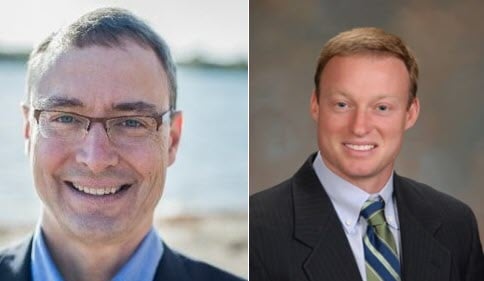Utility managers Sam Paske and Jack Bebee make sure to attend the Utility Management Conference every year put on by the American Water Works Association and the Water Environment Federation.
Every year it seems like there are more and more high-quality conference and education events put on by the associations that support water and wastewater utilities. With a busy workload of managing day-to-day activities at our utilities it is often hard to prioritize the time to attend multi-day conferences out of town, but the one we make sure to attend every year is the Utility Management Conference put on by the American Water Works Association and the Water Environment Federation.
The conference gets better each year and the growing number of attendees shows our peers believe in the event’s value. We find there is no better conference to learn about the current best practices in the industry and how others have successfully implemented new initiatives. Each year we come away with new ideas on improving our operation based on success stories from other agencies.
Some of the topics we’re looking forward to this year include:
Workforce development and recruitment: Like many utilities we are experiencing a wave of retirements and hiring is extremely difficult and competitive. We are focused on developing our employees to fulfil these roles and learning best practices from others is critical. There are three key sessions to address this topic:
- Session 02: Leadership / Workforce Support and Development I on Wednesday, February 26 10:30 a.m. - 12:00 p.m.
- Session 06: Leadership / Workforce Support and Development II Wednesday, February 26 1:30 p.m. - 3:00 p.m.
- Session 10: Strengthening and Diversifying the Water Quality Workforce: Examining Real-World Pathway Programs into Sustainable Infrastructure Careers Wednesday, February 26 3:30 p.m. - 5:00 p.m.
Communications and Public Outreach: While in the past many utilities just operated quietly and efficiently in the background, it has become increasingly important to get your message out into the community and help ratepayers understand how their money is spent. There are several key sessions to highlight best practices in outreach and communication including:
- Session 16: We Need to Change How We Communicate Thursday, February 27 8:30 a.m. - 10:00 a.m.
- Session 19: Importance of Community Support for Your CIP Thursday, February 27 10:30 a.m. - 12:00 p.m.
- Session 20: Understanding How to Communicate with Customers in Today's Media Environment Thursday, February 27 10:30 a.m. - 12:00 p.m.
- Session 24: How to Tell Your Success Story Thursday, February 27 1:30 p.m. - 3:00 p.m.
These few items just scratch the surface of topics we explore in depth at the conference. Several sessions deal with ever present cyber security threats. On the flip side, learn how digital technologies offer improvements to how we work together. Explore ways to address the increasing complexity of capital projects. Find out how to harness the data in our systems that can seem just out of reach. Learn best practices implementing your second or third CMMS, and how to successfully get more out of the software.
Most importantly, you will find time and social events to share your stories with new friends and colleagues. Many organizations are exploring new ideas and innovating in ways we didn’t dream of that long ago – and the leading organizations will be in Anaheim to share what they have learned.


